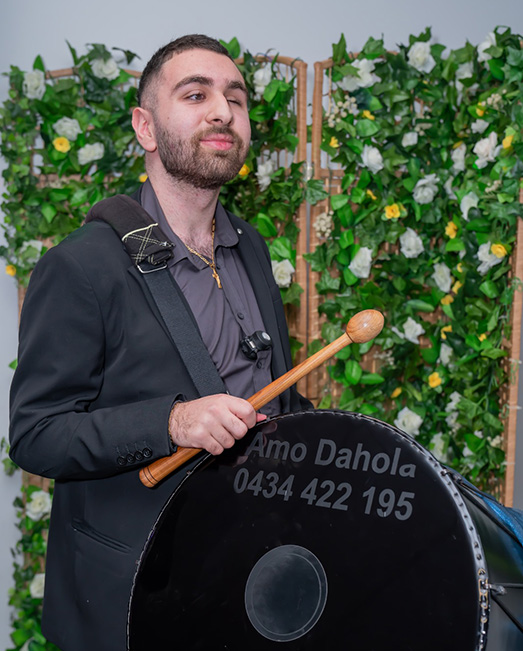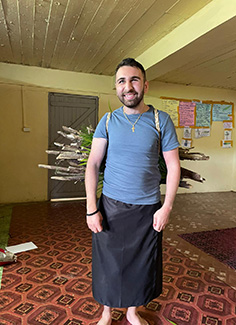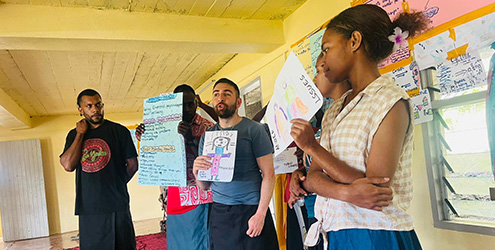Study
Copyright@ Australian Catholic University 1998-2026 | ABN 15 050 192 660 CRICOS registered provider: 00004G | PRV12008
Copyright@ Australian Catholic University 1998-2026 | ABN 15 050 192 660 CRICOS registered provider: 00004G | PRV12008

It’s 2023, and Emmanuel Aushana is frantically browsing the internet, comparing youth work degrees across different universities in Melbourne, one hour before the Victorian Tertiary Admissions Centre applications deadline.
All because of one incorrect assumption.
“I just figured all the youth work courses are the same,” Emmanuel admits.
But when a friend asked if he had actually researched youth work courses, the nerves got to him.
“And it was the last day we had to submit our preferences. We had to submit them at 5pm, and at 4pm I went onto the websites of different universities that offered youth work to check their course subjects,” he says.
Luckily Emmanuel, who is legally blind, can read screens at the speed of thought. Using screen reader software to translate text on his laptop and phone, he “reads” at an astounding 900 words per minute, nearly 10 times the average speaking rate.
Within minutes of researching potential youth work courses, he discovers his first preference university focuses more on youth work policy writing.
But Emmanuel, a self-confessed people-person, is more interested in a course that offers real-world practical training with and for young people.
ACU’s Bachelor of Youth Work ticks all the boxes, with its focus on professional work placement, its foundation in sociology, and strong industry connections paired with in-depth theoretical training on youth development.
With ten minutes to spare, Emmanuel puts ACU as his first preference.
Navigating life without vision is all Emmanuel has ever known.
At six months old, Emmanuel’s parents were concerned about him appearing cross-eyed.
He was diagnosed with histiocytosis, a rare disorder that can cause blindness.
Doctors attempted to ‘fix’ Emmanuel’s eyes, leading to more than six surgeries on his left eye and several others on his right.
But the surgeries were unsuccessful, and Emmanuel was left completely blind in his left eye but has light perception in his right eye and can see some colour.

Emmanuel Aushana during a visit to Fiji.
While the loss of his eyesight at six months of age was a devastating blow to his family, for Emmanuel, it was a blessing in disguise.
“I've lived my life basically blind from the start,” Emmanuel says.
“I don't really have any memory of being able to see fully. I'm kind of lucky in the sense that I became blind when I was that young so I don’t know any different.
“It is what it is. As much complaining as you can do, it’s not going to change anything so I might as well live life.”
The 20-year-old has applied his positive outlook to everything he does, from excelling in his university studies, working part-time in retail, becoming an ordained a subdeacon in the Chaldean Catholic Church (the first of three distinct ranks of Deacon in the ancient faith) and starting a side-hustle as a traditional Assyrian/Iraqi drummer for weddings and parties.
As someone who has overcome numerous challenges to live a full and independent life, Emmanuel has become something of a role model to his peers.
“I’m the kind of person who people come to for advice,” Emmanuel said.
“I like helping my friends through things or giving them advice, or just simply talking to people. I guess people feel like they can trust me and talk to me.”
Emmanuel has also brought these qualities to his university studies in youth work, supporting young people across multiple placements opportunities, including an unforgettable 16-day immersion experience in Fiji.

Emmanuel Aushana during a visit to Fiji.
Run by ACU in partnership with Fiji-based volunteer organisation Think Pacific, students live with a family in a Fijian community village and run workshops with young people on topics like mental health, public health, climate change and business enterprise.
“To be honest, it was one of the best experiences I've had,” Emmanuel said.
“It was like stepping into a different world. It was very enlightening to see the way that they lived in the village, and how community based they all are.
“You could see our work start to impact the youth and their relationships with their own village and their willingness to push through and make the changes that we were speaking about.
“The youth we met obviously asked me a few questions which was good because they were obviously curious and wanted to learn. They were all very, very friendly, and very inclusive of me as well.”
With half of his degree now completed, Emmanuel is keen to explore more ways he can make a difference to the lives of young people.
“A lot of people have helped me through my own life and I guess it's kind of my way of giving back,” Emmanuel said.
Passionate about connecting with others? Explore your future in youth work.
Copyright@ Australian Catholic University 1998-2026 | ABN 15 050 192 660 CRICOS registered provider: 00004G | PRV12008